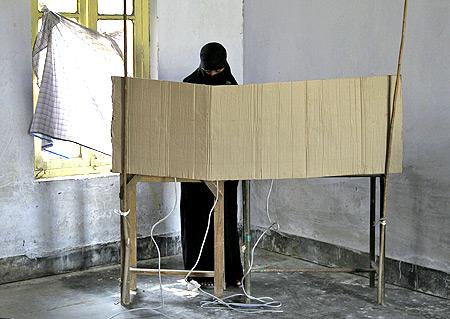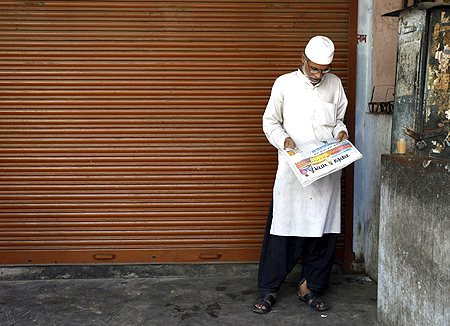
Just like the Congress, Samajwadi Party and BSP, small pro-Muslim parties are focussed on UP's 20 per cent Muslim voters.
But many in the Ghazipur-Bhadohi-Azamgarh-Jaunpur belt insist that there is no such thing as the 'Muslim vote'.
In a college compound behind Peeli Kothi in the Jamuna Talkies area in Varanasi, Afzal Ansari, chief strategist of the Qaumi Ekta Dal, a pro-Muslim political party recently launched in Uttar Pradesh, is working a crowd of about 10,000 Muslim men of all ages.
By the light of a generator which casts large shadows upon the ground, Ansari's gripping rhetoric explains how "our vote" counts in the ongoing Uttar Pradesh election and how it can demolish the Dalit citadel erected by none other than Bahujan Samaj Party leader Mayawati.
Soon he moves on to a key reason why the Qaumi Ekta Dal was set up in the first place: To bring honour and justice to his brother, Mukhtar Ansari, in jail for the last five years without bail.
By the time Afzal is done, the crowd is roused to substantial passion. I ask Salim Ansari, a young weaver and among those who had clapped loudest and hardest when Mukhtar's name came up in Afzal's speech, whether he will support the QED and vote for the imprisoned Mukhtar who is contesting from two seats, Mau and Ghosi.
The election for these two seats were part of the second phase which took place on February 11, although all the votes from all seven phases will be counted altogether on March 6.
"Madam, yeh jo blood na hai hamaara, agar Afzal bhai kahein ki hamein blood dena hai, Madam, to hum apna blood bhi deh sakte hain. Madam uparwala maalik hai, hum Afzalbhai aur Mukhtarbhai ke liye kuchh bhi kar sakte hain, Madam, (Madam, I am willing to even give my blood if Afzal or Mukhtar demand it, I will do anything for them),' Salim says, his eyes seemingly haunted by a superior force.
Please ...
Read Jyoti Malhotra's earlier reports: 'Rahul has single-handedly revived the party'
'We are ready to lead UP into a new dawn'

I ask him why he would do "anything" for someone accused in the 2005 murder of Bharatiya Janata Party MLA Krishnanand Rai.
But Salim was not having any of it. He insisted that Mukhtar Ansari had been framed by a rival gang, that actually he was a messiah of the poor and had done "more work" for the people than any MLA in UP, both sitting and future.
Clearly, Mayawati had thought so too; in 2009, when she took both brothers into her party, who were then in the Samajwadi Party, but expelled them the following year.
A few weeks ago, in the run-up to this election, the courts allowed Mukhtar Ansari to be released for a few days on bail, but Mayawati announced the state didn't have enough security to watch over him outside prison.
The BSP's loss is clearly the QED's gain. It is likely to win a few seats in parts of Poorvanchal, and like other small parties, hopes to be able to tilt the balance in favour of one or other national party when the results to the UP's 403-seat legislature come in.
In fact, rumours that the QED could support the Congress from outside, when the time comes to form the new government, are not unfounded.
"In this election, in the absence of a wave in one party's favour, where there is a fight for every seat, every victory will matter. The party is in a serious fight in 91 seats. The possibility exists that parties like the QED, apart from the RLD (Rashtriya Lok Dal) with which we are in alliance, will give us outside support," admitted a Congress party insider on the condition of anonymity.
That is why in large parts of Poorvanchal, with a significant population of Muslims, pro-Muslim outfits abound. There is the QED in the Ghazipur-Mau-Ghosi belt, the Ulema Council in the Azamgarh-Jaunpur area and Dr Mohammed Ayub's Peace Party in Azamgarh.
Please ...

Just like the Congress, the Samajwadi Party and the Bahujan Samaj Party, these small parties are focussed on UP's 20 per cent 'Muslim vote,' knowing that it could make the difference between defeat and victory.
In the case of a hung assembly, these small parties often hold the key to the swing, very much part of the political trading that goes on behind closed doors. Perhaps, that's one way of acknowledging that there are no untouchables in politics.
However, several political observers and voters in the Ghazipur-Bhadohi-Azamgarh-Jaunpur belt insisted that there is no such thing as the 'Muslim vote.' That Muslims vote like every other religious community, on the basis of caste, candidate quality and the confirmed secular orientation of a political party -- not necessarily in that order.
According to a Samajwadi Party activist who happens to be Muslim, "It is true that the Muslim vote could get fragmented, especially when different parties put up Muslim candidates in the same constituency, targeting the Muslim vote. But if Muslims are going to vote for QED this time and not the SP, as they have for the last several years, we believe that Mukhtar Ansari's reputation will drive the non-Muslims into the Samajwadi fold," he said, speaking on condition of anonymity.
In Azamgarh, young Rizwan insisted that the Ulema Council was the only alternative because it had taken up Delhi's Batla House terror attack in which several people from Azamgarh had been unfairly charged. But he was forced to admit that the Samajwadi Party, the BSP as well as the Congress "would cut into our vote" with the result that the Ulema Council candidate would definitely be impacted.
Please ...

The fact that Muslims abandoned the Congress after the party's mute witness act to the destruction of the Babri Masjid in 1992, and may have, in fact, acquiesced in its demolition, has been a truism for the last two decades in Uttar Pradesh.
In this period, the state's Muslims moved towards 'Maulana Mulayam' and his Samajwadi Party and were also a big factor in the rise of Mayawati in 2007. But in 2012, some are now considering flirting with the Congress.
In the Ataula mosque in Jaunpur, an immense, imposing structure that must count for one of Uttar Pradesh's hidden treasures, I ask a group of Muslims about the "rajnaitik mahaul," or, the political situation.
"Theek hai (it is alright)," said one man, "We are planning to vote for the Congress candidate, Nadeem Javed, because we want to give the Congress a chance." He had barely finished his sentence when his compatriot, an older man with a wispy beard, began to shake his head from side to side.
"Nadeem Javed is not winning. He doesn't even live here, he mostly lives in Delhi, with Rahul Gandhi. He's not one of us," the maulana lookalike said, moving away to perform evening ablutions before entering the mosque for namaaz.
His abrupt departure left the group nonplussed. Then one of those left behind spoke up, cheerily: "You see, the maulana is in favour of the Ulema Council's candidate, he didn't like it when we were talking favourably about the Congress candidate."
Come March 6, that quiet chuckle inside Jaunpur's masjid could soon reverberate all the way to Lucknow.